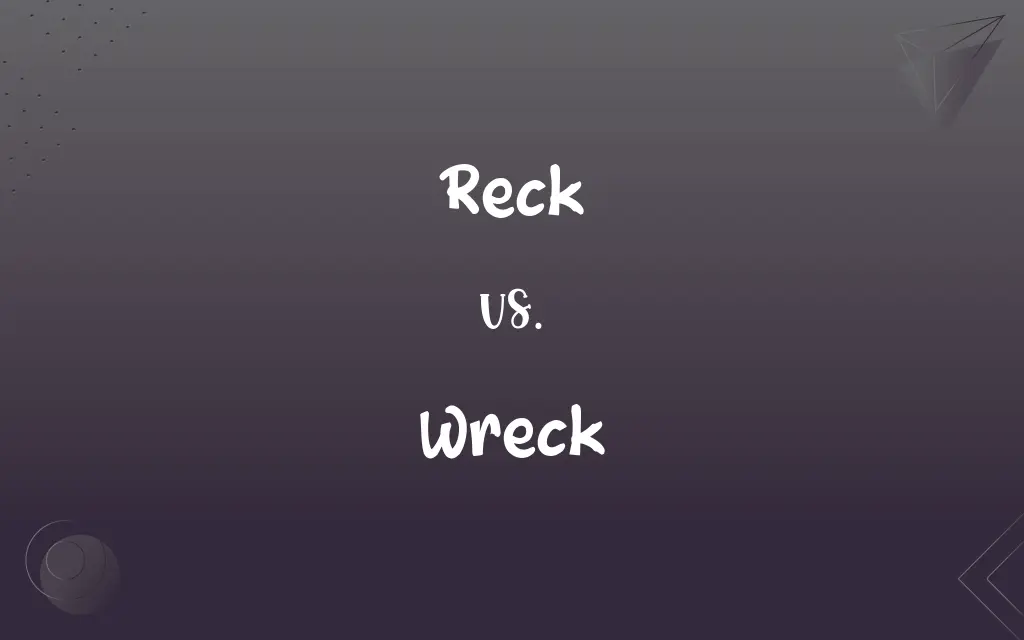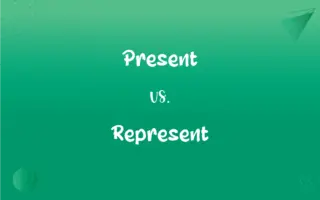Reck vs. Wreck: What's the Difference?
By Aimie Carlson & Harlon Moss || Updated on March 4, 2024
Reck refers to caring or concern, while wreck denotes destruction or ruin.

Key Differences
Reck involves mindfulness or attention, often used in the context of considering or giving heed to something, whereas wreck implies damage or destruction, commonly associated with accidents or the dilapidated state of something.
Reck is archaic and seldom used in modern English, while wreck is widely used to describe anything from vehicular accidents to the complete downfall of physical or intangible entities.
The usage of "reck" often comes in phrases like "reck not" or "little reck," indicating a disregard or lack of concern, on the other hand, "wreck" can be used both as a noun and a verb, illustrating either the act of causing destruction or the result thereof.
While "reck" can denote a personal attitude or stance towards consideration, "wreck" usually involves a physical change or impact, often negative, on objects, structures, or even lives. The emotional connotation of "wreck" often carries a sense of loss and devastation, contrasting with the neutral or even dismissive tone "reck" may convey when indicating lack of care.
Comparison Chart
Part of Speech
Verb
Noun/Verb
ADVERTISEMENT
Definition
To care or have concern for.
Noun: The remains of something destroyed. Verb: To cause destruction or ruin.
Usage
Archaic, rarely used except in specific phrases like "reck not."
Commonly used in modern English.
Context
Indicates a lack of concern or care.
Refers to physical destruction or the remains of something destroyed.
Example Sentence
"She recks not what others think of her actions."
Noun: "The wreck of the ship was found off the coast." Verb: "The hurricane wrecked several homes."
Reck and Wreck Definitions
Reck
To have concern or care.
They reck little of the impending storm.
ADVERTISEMENT
Wreck
A person who is in a very bad physical or emotional state.
He was a complete wreck after the breakup.
Reck
Indicates indifference when used negatively.
He recks not of the consequences.
Wreck
The destruction or ruin of something.
The ship became a wreck after hitting the iceberg.
Reck
Archaic usage, often seen in literature.
Reck thee well, for danger lies ahead.
Wreck
To cause the destruction of a vehicle or structure.
He wrecked his car in a terrible accident.
Reck
To take heed of or to have caution.
Wreck
A vehicle or structure that has been destroyed.
They explored the wreck of the sunken ship.
Reck
To make account of; to care for; to heed, regard, consider.
Wreck
To spoil or ruin something.
The bad weather wrecked their picnic plans.
Reck
To concern, to be important or earnest.
2=Hit ne recketh! (= It recks not!)
Wreck
The act of destroying or the state of being destroyed; destruction
"The filmmaker ... was hardly the first person to blame misguided agriculture for the wreck of the plains" (Timothy Egan).
Reck
To think.
Wreck
Accidental destruction of a ship; a shipwreck.
Reck
To make account of; to care for; to heed; to regard.
This son of mine not recking danger.
And may you better reck the redeThan ever did the adviser.
Wreck
The stranded hulk of a severely damaged ship.
Reck
To concern; - used impersonally.
What recks it them?
Wreck
Fragments of a ship or its cargo cast ashore by the sea after a shipwreck; wreckage.
Reck
To make account; to take heed; to care; to mind; - often followed by of.
Then reck I not, when I have lost my life.
I reck not though I end my life to-day.
Of me she recks not, nor my vain desire.
Wreck
An automobile or railroad collision or accident
Witnessed a wreck on the highway.
Wreck
The remains of something that has been wrecked, especially an automobile that has crashed
Walked away unharmed from the wreck.
Wreck
Something that is dilapidated or worn out
Still driving that wreck of a car.
Living in a wreck of a house.
Wreck
A person who is physically or mentally worn out.
Wreck
To cause the destruction of in a collision
Wrecked the car by hitting a tree.
Wreck
To dismantle or raze; tear down.
Wreck
To cause to undergo ruin or disaster
An argument that wrecked their friendship. See Usage Note at wreak.
Wreck
To suffer destruction or ruin; become wrecked
A ship that wrecked on the rocks.
Wreck
(Informal) To experience or cause an accident in which the vehicle one is riding in is badly damaged
They were speeding over 70 miles an hour when they wrecked.
Wreck
To work as a wrecker.
Wreck
Something or someone that has been ruined.
He was an emotional wreck after the death of his wife.
Wreck
The remains of something that has been severely damaged or worn down.
Wreck
An event in which something is damaged through collision.
Wreck
A shipwreck: an event in which a ship is heavily damaged or destroyed.
Wreck
Goods, etc. cast ashore by the sea after a shipwreck.
Wreck
(ornithology) A large number of birds that have been brought to the ground, injured or dead, by extremely adverse weather.
Wreck
(transitive) To destroy violently; to cause severe damage to something, to a point where it no longer works, or is useless.
He wrecked the car in a collision.
That adulterous hussy wrecked my marriage!
Wreck
(transitive) To ruin or dilapidate.
Wreck
To dismantle wrecked vehicles or other objects, to reclaim any useful parts.
Wreck
(transitive) To involve in a wreck; hence, to cause to suffer ruin; to balk of success, and bring disaster on.
Wreck
(intransitive) To be involved in a wreck; to be damaged or destroyed.
Wreck
See 2d & 3d Wreak.
Wreck
To destroy, disable, or seriously damage, as a vessel, by driving it against the shore or on rocks, by causing it to become unseaworthy, to founder, or the like; to shipwreck.
Supposing that they saw the king's ship wrecked.
Wreck
To bring wreck or ruin upon by any kind of violence; to destroy, as a railroad train.
Wreck
To involve in a wreck; hence, to cause to suffer ruin; to balk of success, and bring disaster on.
Weak and envied, if they should conspire,They wreck themselves.
Wreck
To suffer wreck or ruin.
Wreck
To work upon a wreck, as in saving property or lives, or in plundering.
Wreck
The destruction or injury of a vessel by being cast on shore, or on rocks, or by being disabled or sunk by the force of winds or waves; shipwreck.
Hard and obstinateAs is a rock amidst the raging floods,'Gainst which a ship, of succor desolate,Doth suffer wreck, both of herself and goods.
Wreck
Destruction or injury of anything, especially by violence; ruin; as, the wreck of a railroad train.
The wreck of matter and the crush of worlds.
Its intellectual life was thus able to go on amidst the wreck of its political life.
Wreck
The ruins of a ship stranded; a ship dashed against rocks or land, and broken, or otherwise rendered useless, by violence and fracture; as, they burned the wreck.
Wreck
The remain of anything ruined or fatally injured.
To the fair haven of my native home,The wreck of what I was, fatigued I come.
Wreck
Goods, etc., which, after a shipwreck, are cast upon the land by the sea.
Wreck
Something or someone that has suffered ruin or dilapidation;
The house was a wreck when they bought it
Thanks to that quack I am a human wreck
Wreck
An accident that destroys a ship at sea
Wreck
A serious accident (usually involving one or more vehicles);
They are still investigating the crash of the TWA plane
Wreck
A ship that has been destroyed at sea
Wreck
Smash or break forcefully;
The kid busted up the car
FAQs
Can "reck" and "wreck" be used interchangeably?
No, "reck" and "wreck" have different meanings and cannot be used interchangeably.
Is "reck" commonly used in modern English?
No, "reck" is considered archaic and is rarely used in modern English.
What is an example of a situation where "wreck" might be used?
"Wreck" might be used to describe a car that has been severely damaged in an accident.
What part of speech is "reck"?
"Reck" is primarily used as a verb in English.
What does it mean when someone is described as a "wreck"?
When someone is described as a "wreck," it means they are in a very bad physical or emotional state.
Can "wreck" be used as a verb?
Yes, "wreck" can be used as a verb meaning to cause the destruction of something.
How might "reck" be used in a sentence to indicate caution?
"Reck" might be used to advise caution with a phrase like, "You would do well to reck the warnings given."
What does "reck" mean?
"Reck" means to care for or be concerned about something.
How is "wreck" used in the context of relationships or emotional states?
In emotional contexts, "wreck" can describe someone devastated by grief, stress, or heartbreak, indicating a severe impact on their emotional well-being.
Can "wreck" refer to the aftermath of an event?
Yes, "wreck" can refer to the aftermath, especially to describe the remains or ruins after a destructive event.
Is "wreck" always associated with physical damage?
While "wreck" often refers to physical damage, it can also describe severe emotional or financial distress.
What does it mean to "wreck havoc"?
To "wreck havoc" means to cause extreme chaos or disorder, often used to describe the impact of natural disasters or tumultuous events.
Can "reck" imply a positive attitude?
"Reck" generally implies a neutral or dismissive attitude rather than a positive one, focusing on the lack of concern or care.
What is the etymology of "reck"?
"Reck" originates from Old English "reccan," meaning to care for or be concerned about.
Is there a historical context in which "reck" was more commonly used?
"Reck" was more commonly used in Middle and Old English texts and has largely fallen out of use in modern language.
Is "reck" used in any contemporary phrases or idioms?
"Reck" is rare in contemporary language but may appear in historical or literary texts in phrases like "reck not" or "little reck."
What are some synonyms for "wreck"?
Synonyms for "wreck" include ruin, destroy, demolish, and devastate.
Can "reck" and "wreck" be found in legal language?
"Wreck" may appear in legal contexts related to damage or liability, while "reck" is unlikely due to its archaic nature.
Can "wreck" be used metaphorically?
Yes, "wreck" can be used metaphorically to describe anything severely damaged or ruined, not just physical objects.
How does the context change the meaning of "wreck"?
The context can shift "wreck" from literal physical destruction to metaphorical uses, like describing emotional states or financial ruin.
About Author
Written by
Aimie CarlsonAimie Carlson, holding a master's degree in English literature, is a fervent English language enthusiast. She lends her writing talents to Difference Wiki, a prominent website that specializes in comparisons, offering readers insightful analyses that both captivate and inform.
Co-written by
Harlon MossHarlon is a seasoned quality moderator and accomplished content writer for Difference Wiki. An alumnus of the prestigious University of California, he earned his degree in Computer Science. Leveraging his academic background, Harlon brings a meticulous and informed perspective to his work, ensuring content accuracy and excellence.































































